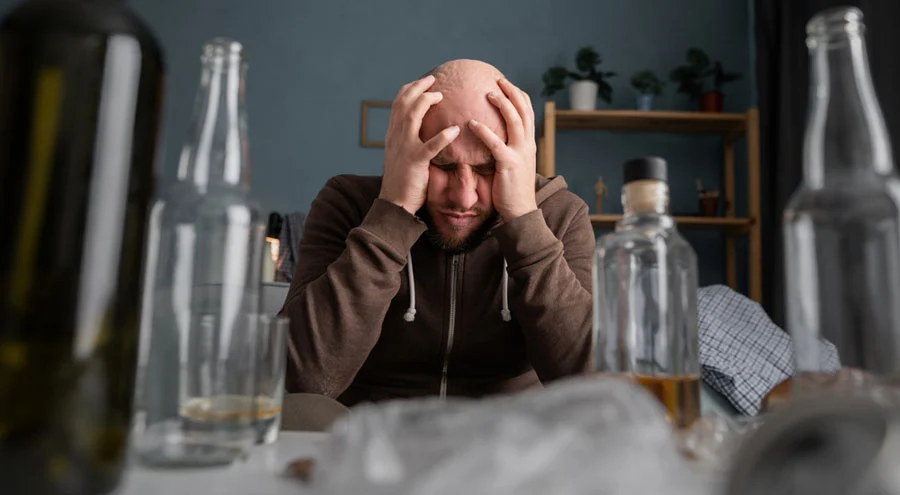Looking Into Both Short and Long-Term Sobriety Timelines
How long does it take to get sober? This is a question that’s often deployed from two separate platforms – both of which have very different motivations. In fact, one could even reason that the driving forces behind each question are polar opposites on the recovery spectrum.
If one of your friends has been engaged in a long night of drinking and asks “How long does it take to get sober?” – the chances are high that they’re actively engaged in alcohol abuse with no clear signs of slowing down.
Alternatively – if you have a friend who’s been considering treatment and asks, “How long does it take to get sober?” – it’s likely they’ve had enough of drinking alcohol, and are prepared to proactively combat alcohol addiction.
In this article, we’ll provide answers for both, approaching both mindsets with insightful information to help lead you toward treatment for alcohol addiction at South Shores Detox, our leading Orange County treatment center.
How Long Does It Take to Get Sober After Consuming Alcohol?
If you’ve been drinking alcohol, and suddenly need to operate a vehicle or take on any other challenge that requires sobriety, attempting to overcome the impact of binge drinking can be overwhelming and nerve-racking. Alcohol intoxication doesn’t have a magical cure – as your blood alcohol concentration ultimately decides when you reach the point of sobriety – especially when it comes to the law.
Even if you feel sober, excessive alcohol consumption can linger, causing impairment and certainly surpassing the legal BAC (blood alcohol content) in most states. So, how much alcohol can you drink without being drunk? How long does it take alcohol consumed to expel so it’s safe for you to drive or engage in activities that require sobriety?
The following section outlines the blood alcohol concentration levels and the amount of time it takes the body to metabolize after alcohol intake.
Examples of a Person’s Blood Alcohol Concentration & Standard Drink Measurements
Everybody is different biologically – so it’s only natural that alcohol metabolism varies from person to person. The amount of time to sober up depends on several factors, including:
- Amount of alcohol consumption
- Type of alcoholic drink consumed
- How frequently do you drink alcohol?
- Whether binge drinking has taken place
- Your weight
As a general rule, it takes a person one hour to metabolize one unit of alcohol. One unit is considered “a drink” which is usually categorized as one of the following:
- 12 oz. of beer at about 5% ABV
- 5 oz. of wine at about 12% ABV
- One shot of liquor at about 40% ABV (80 proof)
If you believe you’ve consumed too much alcohol, generally the accepted protocol is one hour for each drink. Based on this thought process, if you’ve had 5 shots, in theory, you’d have to wait 5 hours before you were sober. However several other factors contribute to the results.
Additional BAC Factors and Defining a “Standard Drink”
The above measurements are considered “standard drinks.” There’s nothing wrong with accepting this – but what happens when the way a standard drink is consumed changes? Would this no longer be considered a measurement of a standard drink?
For example – someone who consumes 5 shots of liquor over several hours metabolizes the alcohol differently than someone who pounds 5 shots in 5 minutes. The truth is, when the frequency ramps up, and you’ve increased alcohol consumption, the body can’t metabolize your drinks as fast.
And how does body weight come into play?
If a 125-pound person consumes 3 drinks at a moderate pace, the BAC level would be somewhere around .11 – about 30-35% higher than the legal limit in most states. After 3 hours, the BAC would drop to .06 – which is .01 under the legal limit (.07) in most states.
Substitute the individual for a 100-pound person, and the initial BAC inflates to .14. After a 3-hour period, the BAC still hovers around .1 – well over the legal limit. It would take somewhere between 5 and 6 hours for this individual to drop to a .05 or .06.
So, you’ve been drinking and now you need to drive home faster than you thought. Or maybe you have a meeting with your boss – or even worse, your probation officer – and you NEED to sober up. What are some tactics you can use to expedite the process?
What Does It Take to Sober Up Quicker? 3 Myths Dissected
Depending on who you ask, there are multiple remedies available that are rumored to speed up the process of sobering up. What does it take to sober up quicker? It turns out that most of these age-old methods are just placebo effects if nothing more. Let’s take a look at some of the more popular “remedies.”
1) Drinking A Large Amount of Water
Many believe that drinking a substantial amount of water in a short period will help you sober up quickly. The idea is to stop drinking alcohol and transition to nothing but water, in turn “diluting” the alcohol in your body and sobering you up.
The reality is drinking water in heavy amounts in addition to binge drinking only leads to frequent trips to the bathroom.
2) Drinking Coffee
This is a go-to for many people with hangover symptoms. Have a cup of coffee and you’ll sober up much faster, right? Wrong.
In fact, drinking coffee could potentially make your situation worse, as it can cause stomach irritation and doesn’t exactly mix well with a stomach full of beer, wine, or liquor.
3) Cold Shower
Old faithful. A cold shower has to work, helping you get sober almost instantly on contact. While a frigid shower might give you a second wind and perk you up for a short period – the only thing you’ll accomplish is being clean and drunk.
The truth is, there’s only one thing that can eliminate alcohol from your system – time. Anything besides this is an old wive’s tale, and unfortunately, a waste of your time.
The true way to “sober up” is to actively combat alcohol use disorder. This is the only 100% tried and true way to avoid hangovers, eclipse the BAC and avoid any alcohol-related issues – legal or otherwise.
How Long Does It Take to Get Sober – for Good?
So, how long does it take to get sober on a permanent basis? Well, the answer to this weighs solely on the individual hoping to achieve sobriety. Just as with the question: How long is rehab for drugs and alcohol, there is not a set answer, it varies based on your needs and goals in seeking treatment.
There are several challenges that lie ahead – but nothing you can’t handle with the right amount of willpower and a strong team acting as your support system.
Let’s take a look at the actual timeline for alcohol withdrawal.
A Typical Alcohol Withdrawal Timeline During Alcohol Detox
Overcoming alcohol withdrawal doesn’t constitute sobering up – but it’s an excellent start and a task that must be realized before journeying towards long-term recovery.
- 24 Hours. After 12-24 hours without a drink, you’ll begin feeling the impact of alcohol withdrawal symptoms. Initially, this includes anxiety, sweating, irritability, restlessness, and stomach cramps alongside nausea.
- Days 2-3. This is not the most intense part of alcohol detox, but you’re getting close. After the first day, you’ll begin to experience extreme nausea. Vomiting and diarrhea will ensue, and you’ll have a difficult time keeping any liquids or food down. This is when dehydration becomes a serious risk. Your blood pressure will spike, which is actually one of the primary causes of most withdrawal symptoms.
- Days 4-5. This is when you enter the most intense and dangerous part of alcohol withdrawal. You’ll suffer from what’s known as delereum tremens, or DTs. This is a severe psychological ordeal that causes hallucinations and psychosis. In certain cases, this stage can be fatal.
- Day 6 and Beyond. As days 6 and 7 approaches, your symptoms will take a drastic downturn and begin to subside. You’ll still experience things like restless legs and even difficulty sleeping, but nothing near the intensity of the previous stages.
After getting support and passing through withdrawal, you can begin to focus on the mental elements of recovery. There’s no set timeline for this stage, as it all rests entirely on your pace and approach towards recovery. There are certain actions you can take to enhance the recovery process.
How to Get Sober for Good
The following dynamics will help you in your journey toward long-term alcohol recovery:
- Treatment at South Shores Detox
- A strong support system at home or work
- Making new friends and avoiding old drinking buddies
- Avoiding physical locations where you used to drink (bars, etc.)
- Pharmaceutical approaches
- AA and NA meetings
Rebuild for Lasting and Successful Sobriety at South Shores
Imaging getting sober is like building a house. Different layers and steps are involved that require your attention – but the most important step is laying a solid foundation. At South Shores Detox, we can give you the tools you need to lay a solid foundation that helps you rebuild your life for recovery.
For more information on our program, contact a member of our admissions team today. Please make the confidential call now, to get more details and options for support today!




